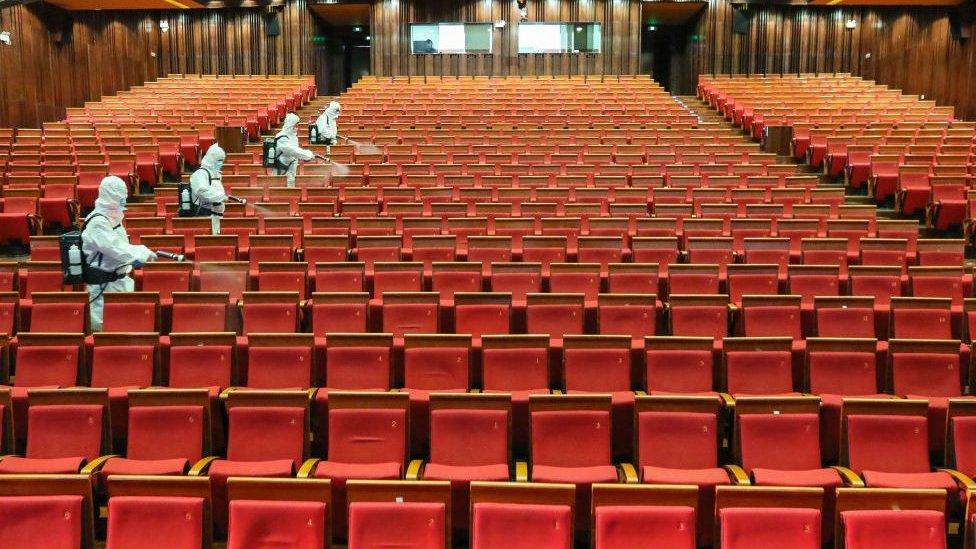Thousands of cinemas in China under threat of closure
- Published

More than 40% of cinemas in China could go bust, according to a bleak report by the China Film Association.
Having been temporary closed during the virus pandemic, audiences may struggle to return, the association says.
Millions of Chinese have enjoyed watching movies online during cinema closures thanks to a wide range of streaming services.
As a result, thousands could shut permanently in a "massive bloodbath" predicts one Chinese business expert.
There are now more than 12,000 cinemas in China, according to market research firm IBISWorld. This figure has more than doubled in the past decade as China has embraced movie-going.
But four out of 10 said they "are very likely to close" in the near future, according to the China Film Association survey. This could mean nearly 5,000 cinemas going bust as a result of the pandemic.
Cinemas have been among the last venues to reopen in China as lockdown measures are gradually lifted. The Chinese government said that cinemas, along with other indoor entertainment venues, could reopen with limited bookings.
In the first quarter of 2020, China's box office takings have fallen significantly, according to the film association. Small cinemas with fewer than 500 seats suffered the most, with revenues only reaching 10% of those taken during the same period last year.
If cinema re-openings are delayed until October, annual revenues would plunge by 91% across the board, the association predicts. Last year, China generated 64.2bn yuan (£7.2bn) from movie ticket sales as millions flocked to cinemas.
Online boom
Shaun Rein, founder of the China Market Research Group, believes a major challenge will be the growing strength of China's online movie sector, which is hugely competitive with platforms such as Iqiyi, Youkou and Tencent Video.
He said subscriptions were cheap at around $2 a month for a basic package, while movie tickets often sell for $20.
"Chinese players are just so cheap, often because they are subsidised as they are owned by giant internet players like Alibaba, Baidu or Tencent," he said.
"Aside from fears over catching Covid-19, consumers won't go back to cinemas anytime soon as the digital offerings are too good and cheap,"
He also predicted more pain for cinemas if film companies start to launch direct-to-digital offerings and charge higher prices for online movie releases on a pay-as-you-go basic on top of subscription rates. "I expect the cinema sector to face a massive bloodbath and many will go out of business," he added.
Lack of new releases
Another challenge is getting people back into cinemas due to the lack of new films, with production curtailed due to travel and social restrictions.
"We hear about 20% of local productions have begun or resumed physical work, with the balance postponed or in financial difficulty related to the Covid-19 outbreak," said Rance Pow, chief executive of Artisan Gateway, an Asian film industry consultant.
"So that complicates the timing and recovery of cinemas as well; 'must see' films will be needed like never before to bolster the industry recovery".
Some have warned that China's film industry will lose up to 30bn yuan this year, including the National Film Administration, a government body.
Others are less pessimistic about the fortunes of China's cinemas. "The predictions are dire, but I'm more optimistic," said Chris Fenton, a former motion picture president and author of Feeding the Dragon. He points to the Chinese government's desire to have a world-class film industry and largest market in the world.
"Plus the Chinese have embraced movie-going into the cultural fabric of society. It's a habit they are rabid about. That urge to visit cinemas regularly has not waned".
- Published5 July 2022
